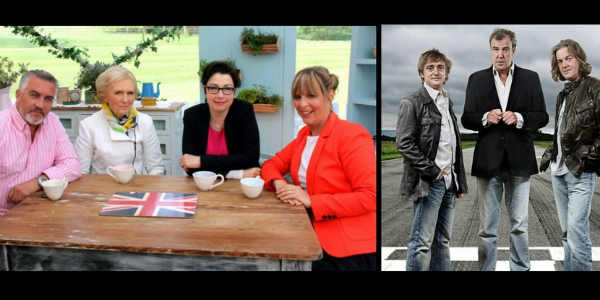 A lot of folks today think that, just because you call something by a certain name, that means it’s actually the thing in question.
A lot of folks today think that, just because you call something by a certain name, that means it’s actually the thing in question.
But reality is stubborn. Some things just ARE, and they can’t be reimagined, remade, redone, reassembled, renamed or reconstituted. Either you get the real thing, or it’s nothing at all.
For example, take the case of “Top Gear.”
In early 2015, the BBC sacked Jeremy Clarkson, one of the hosts of the British network’s long-running car (and comedy and crazy stunt) show, “Top Gear,” over an on-set fracas. Clarkson’s longtime co-stars, Richard “Hamster” Hammond and James “Captain Slow” May, voluntarily exited with him.
With the three of them left the heart and soul of the U.K. version of “Top Gear.” The BBC has tried a variety of other hosts, but everything they’ve produced is just a pale imitation of the original. Because “Top Gear” is not just about cars and stunts, it’s about the personalities of the hosts and the relationships among them. Subtract those, and you have something called “Top Gear,” but it’s an entirely different show.
Now the three (and an original “Top Gear” producer) are over on Amazon Prime Video with a rollicking new car-themed (and stunt-heavy) show called “The Grand Tour,” which sends the hosts on global adventures. It premiered on Nov. 18, and after seeing two episodes, it’s like coming home to find everything redecorated, but it’s home nonetheless.
People are still watching something called “Top Gear,” but without Clarkson, the Hamster and Captain Slow, it’s just a poser.
Meanwhile, also on the BBC is “The Great British Bake Off” (shown in America on PBS as “The Great British Baking Show,” and also on Netflix), quite possibly the most delightful cooking-competition show I’ve ever seen. Or, at least it used to be.
Since premiering in 2010, the show pitted multicultural amateur British bakers against each other in a kitchen set underneath a tent on the grounds of a lush English estate. The hosts were the comedy team of Sue Perkins and Mel Giedroyc, and their co-hosts and judges were professional bakers Paul Hollywood and Mary Berry.
Suddenly, in September, the producers announced they were taking the show from the BBC to rival commercial network Channel 4. The hosts weren’t consulted and mostly weren’t happy. Perkins and Giedroyc departed, followed by Mary Berry, leaving only Hollywood of the original quartet.
There are two December specials left with the first four hosts, then the gang splits up.
So, what has Channel 4 bought? Not much. The charm of the show is as much in the hosts — especially Berry — as it is in the format. I’m just not interested in whom Channel 4 rustles up to round out the crew. It won’t ever be “The Great British Baking Show” I fell in love with.
So what does all this have to do with keeping Christ in Christmas? Everything. You can’t take the core out of something and still claim it’s the same thing.
Christmas, by definition, is the celebration of Christ’s birth. If He’s not there, then you may call it Christmas, but it’s something else. The so-called “secular Christmas” is just a rattly assemblage of random decorations, traditions that, taken out of context, often make very little sense, and various deeply personal memories and attempts at attaching meaning to a day from which the true meaning has been removed.
To be sure, there are things compiled into the Christmas celebration that are adapted from various cultures and have a variety of origins. With a holiday this old and this universal, that’s bound to happen. But you could strip all of those away, and the core of Christmas — the Mass of the Birth of Christ, or the Nativity — would remain unchanged. Whether you have a Christmas tree or a pinata or lasagna or turkey or popcorn garlands or inflatable Santas on the lawn, they’re all just after-market add-ons.
Christmas is about love because Christ is Love; it’s about Family because of the Holy Family; it’s about Home, because the Son of God was born far from his parents’ home, in a lowly manger; it’s about Joy because Hope has been born; and it’s about Celebration because Light has come into a dark world.
Back before I returned to the Church, I marked the Winter Solstice, and out of respect for a Faith I wasn’t practicing, I kept Christ out of it. My tree had no Christian symbols on it; and my cookies weren’t shaped like angels; and there was no Nativity set. But the decorations were lovely, the food was good, and there was family and fellowship.
It was fun and festive, but it ultimately rang hollow. So, late at night, by myself, I’d still watch Midnight Mass from the Vatican on TV.
All the rest was certainly Christmasy, but it wasn’t Christmas. We’ve let the world take the name of our holiday, water it down, exploit it and profane it. To use the parlance of the politically correct Left, it’s one of the biggest instances of “cultural appropriation,” and it’s committed against all of Christendom. People have all kinds of Christ-free celebrations on and about Dec. 25, and many of them are warm and charming and sweet, and they may be called Christmas, but they’re not.
The BBC may call it “Top Gear,” but it’s not. Channel 4 has bought a name, but not the thing itself. And if this is true about something as wordly and ultimately inconsequential as television, then how much more true is it of Truth itself?
Even the virulently secular Starbucks figured it out, and added a Nativity scene to its selection of red “holiday” cups.
Christmas belongs to Christians. It is the Mass of the Nativity, of the Birth of Christ — nothing more and nothing less.
Accept no substitutes.
Image: Courtesy BBC
Don’t miss a thing: head over to my other home at CatholicVote and like my Facebook page; also like the Patheos Catholic FB page to see what my colleagues have to say.













